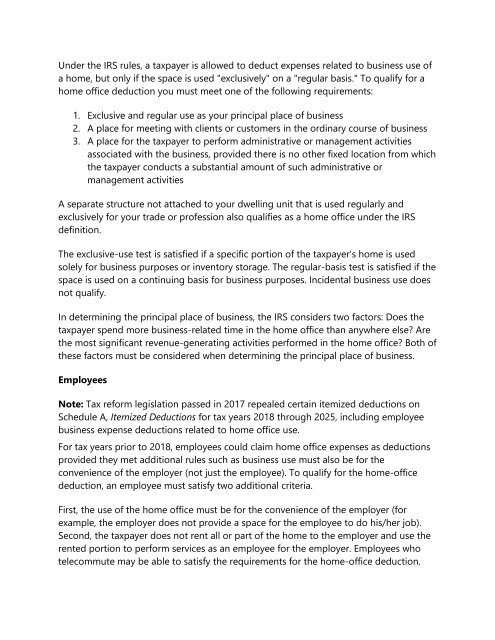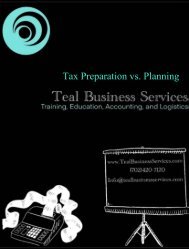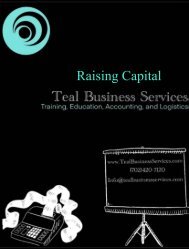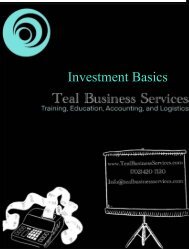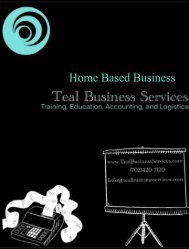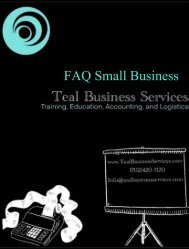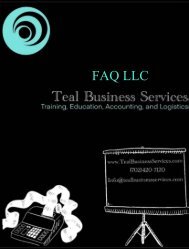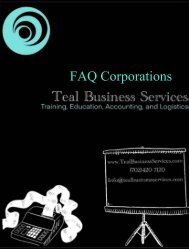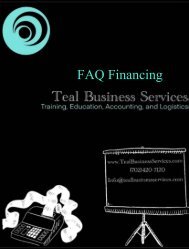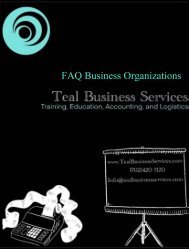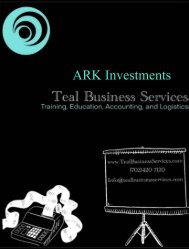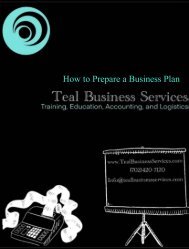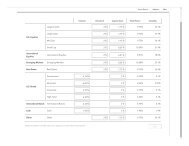Home office deduction
Create successful ePaper yourself
Turn your PDF publications into a flip-book with our unique Google optimized e-Paper software.
Under the IRS rules, a taxpayer is allowed to deduct expenses related to business use of<br />
a home, but only if the space is used "exclusively" on a "regular basis." To qualify for a<br />
home <strong>office</strong> <strong>deduction</strong> you must meet one of the following requirements:<br />
1. Exclusive and regular use as your principal place of business<br />
2. A place for meeting with clients or customers in the ordinary course of business<br />
3. A place for the taxpayer to perform administrative or management activities<br />
associated with the business, provided there is no other fixed location from which<br />
the taxpayer conducts a substantial amount of such administrative or<br />
management activities<br />
A separate structure not attached to your dwelling unit that is used regularly and<br />
exclusively for your trade or profession also qualifies as a home <strong>office</strong> under the IRS<br />
definition.<br />
The exclusive-use test is satisfied if a specific portion of the taxpayer's home is used<br />
solely for business purposes or inventory storage. The regular-basis test is satisfied if the<br />
space is used on a continuing basis for business purposes. Incidental business use does<br />
not qualify.<br />
In determining the principal place of business, the IRS considers two factors: Does the<br />
taxpayer spend more business-related time in the home <strong>office</strong> than anywhere else? Are<br />
the most significant revenue-generating activities performed in the home <strong>office</strong>? Both of<br />
these factors must be considered when determining the principal place of business.<br />
Employees<br />
Note: Tax reform legislation passed in 2017 repealed certain itemized <strong>deduction</strong>s on<br />
Schedule A, Itemized Deductions for tax years 2018 through 2025, including employee<br />
business expense <strong>deduction</strong>s related to home <strong>office</strong> use.<br />
For tax years prior to 2018, employees could claim home <strong>office</strong> expenses as <strong>deduction</strong>s<br />
provided they met additional rules such as business use must also be for the<br />
convenience of the employer (not just the employee). To qualify for the home-<strong>office</strong><br />
<strong>deduction</strong>, an employee must satisfy two additional criteria.<br />
First, the use of the home <strong>office</strong> must be for the convenience of the employer (for<br />
example, the employer does not provide a space for the employee to do his/her job).<br />
Second, the taxpayer does not rent all or part of the home to the employer and use the<br />
rented portion to perform services as an employee for the employer. Employees who<br />
telecommute may be able to satisfy the requirements for the home-<strong>office</strong> <strong>deduction</strong>.


